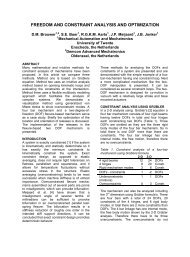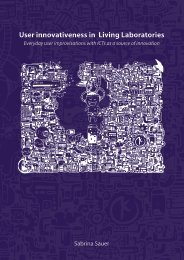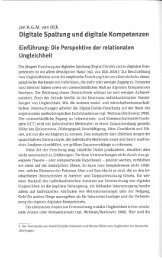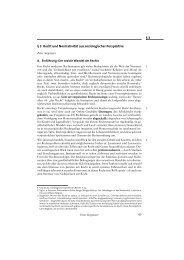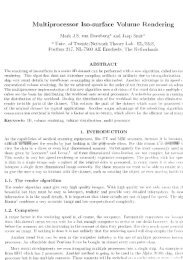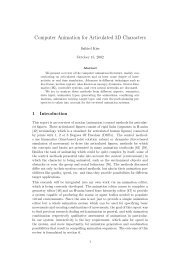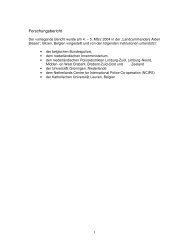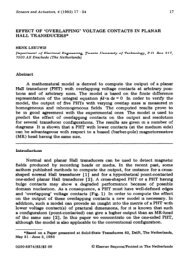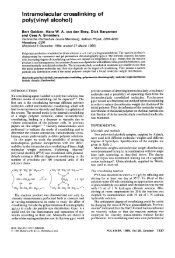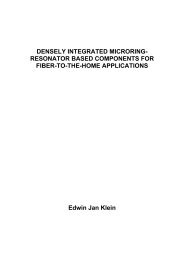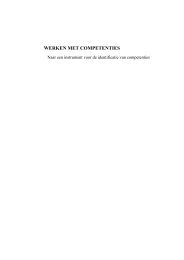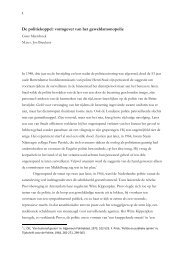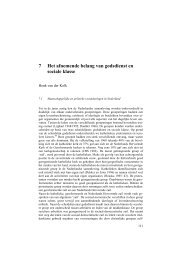Innovation and institutional change: the transition to a sustainable ...
Innovation and institutional change: the transition to a sustainable ...
Innovation and institutional change: the transition to a sustainable ...
Create successful ePaper yourself
Turn your PDF publications into a flip-book with our unique Google optimized e-Paper software.
Analytical framework 61<br />
guided <strong>and</strong> constrained by <strong>the</strong> way <strong>the</strong> system is configured through linkages<br />
between multiple dimensions <strong>and</strong> multiple levels. The multiple dimensions<br />
we turn <strong>to</strong> later are located in areas of knowledge, policy, <strong>the</strong> market, <strong>and</strong><br />
society. The multiple levels include <strong>the</strong> level of ac<strong>to</strong>rs, networks,<br />
technologies, <strong>and</strong> practices, <strong>the</strong> sociotechnical system level, <strong>and</strong> society <strong>and</strong><br />
its structures. This conceptualisation builds upon <strong>the</strong> multi-level <strong>and</strong> regime<br />
perspective developed by Rip <strong>and</strong> Kemp (1998) <strong>and</strong> o<strong>the</strong>rs, but diverges as<br />
societal structures are introduced as a separate level. In <strong>the</strong> work of scholars<br />
on <strong>transition</strong> <strong>the</strong>ory, <strong>the</strong> l<strong>and</strong>scape level has been conceptualised ra<strong>the</strong>r weak<br />
as a set of diverse external fac<strong>to</strong>rs, such as oil shocks, wars, but also cultural<br />
values <strong>and</strong> broad political coalitions (Geels, 2004a: 34). We do not argue<br />
with <strong>the</strong> idea that real external fac<strong>to</strong>rs, such as oil crises or climate <strong>change</strong>,<br />
put pressure on regimes, but contend that <strong>the</strong> way pressure is put on <strong>the</strong><br />
regime takes place in a translation process within <strong>the</strong> wider societal<br />
structures in which <strong>the</strong> sociotechnical system is embedded.<br />
Let us return <strong>to</strong> our LASTPIN approach <strong>and</strong> introduce <strong>the</strong> core elements of<br />
ac<strong>to</strong>rs, technologies, practices, <strong>and</strong> networks 1 :<br />
Ac<strong>to</strong>rs, <strong>the</strong>ir behaviour, underlying objectives <strong>and</strong> beliefs, competencies, <strong>and</strong><br />
resources, on <strong>the</strong> one h<strong>and</strong> are conditioned <strong>and</strong> constrained by existing<br />
systems but on <strong>the</strong> o<strong>the</strong>r h<strong>and</strong> shape <strong>the</strong> way systems develop, <strong>and</strong> some<br />
ac<strong>to</strong>rs may act as prime movers in <strong>the</strong> shaping of alternative paths <strong>and</strong>,<br />
eventually, new systems. Ac<strong>to</strong>rs are central in establishing <strong>and</strong> changing<br />
systems, as decisions, activities, investments <strong>and</strong> strategies of ac<strong>to</strong>rs<br />
determine <strong>the</strong> way <strong>the</strong> system develops. Essential in our underst<strong>and</strong>ing,<br />
based mainly on insights of evolutionary thinking, is <strong>the</strong> role of routines in<br />
<strong>the</strong> behaviour of ac<strong>to</strong>rs (individuals but also organisations). Routines are<br />
based on acquired competencies, accumulated experiences, <strong>and</strong> learning, <strong>and</strong><br />
it is difficult <strong>to</strong> re-learn or de-learn <strong>to</strong>wards o<strong>the</strong>r routines. Humans develop<br />
routines <strong>to</strong> guide daily activity, but firms also develop routines in <strong>the</strong>ir<br />
management <strong>and</strong> production, <strong>and</strong> for <strong>the</strong> evaluation of investments or<br />
technologies. Frames of reference are developed based on accumulated<br />
experiences, <strong>and</strong> involvement in alternative practices (including<br />
technologies) requires de-routinising <strong>and</strong> reflective behaviour. As knowhow,<br />
routines, decision rules <strong>and</strong> dominant competencies are relatively<br />
invariant, this gives rise <strong>to</strong> dominant designs, technological regimes <strong>and</strong><br />
paradigms (Saviotti, 1996: 45). This culminates in <strong>the</strong> establishment of<br />
belief systems shared by coalitions of ac<strong>to</strong>rs, with certain problem<br />
1 The process of formation of <strong>the</strong>se elements was fur<strong>the</strong>r inspired by <strong>the</strong> work of various<br />
scholars on technological systems <strong>and</strong> innovation processes, such as Kash <strong>and</strong> Rycroft,<br />
1999; Van de Ven et al., 1999; Carlsson et al., 2002; Jacobsson <strong>and</strong> Johnson, 2000;<br />
Berkhout et al., 2002; <strong>and</strong> Arentsen 2002.



